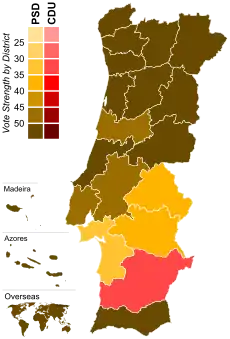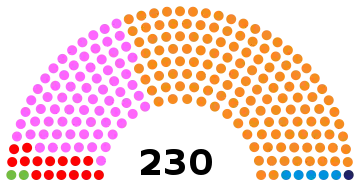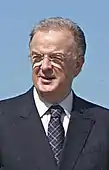1991 Portuguese legislative election
The Portuguese legislative election of 1991 took place on 6 October. The election renewed all 230 members of the Assembly of the Republic. There was a reduction of 20 seats compared with previous elections, due to the 1989 Constitutional revision.[4]
| ||||||||||||||||||||||||||||||||||||||||||||||||||||||||||||||||||||||||||
230 seats to the Portuguese Assembly 116 seats needed for a majority | ||||||||||||||||||||||||||||||||||||||||||||||||||||||||||||||||||||||||||
|---|---|---|---|---|---|---|---|---|---|---|---|---|---|---|---|---|---|---|---|---|---|---|---|---|---|---|---|---|---|---|---|---|---|---|---|---|---|---|---|---|---|---|---|---|---|---|---|---|---|---|---|---|---|---|---|---|---|---|---|---|---|---|---|---|---|---|---|---|---|---|---|---|---|---|
| Registered | 8,462,357 | |||||||||||||||||||||||||||||||||||||||||||||||||||||||||||||||||||||||||
| Turnout | 5,735,431 (67.8%) | |||||||||||||||||||||||||||||||||||||||||||||||||||||||||||||||||||||||||
| ||||||||||||||||||||||||||||||||||||||||||||||||||||||||||||||||||||||||||
 Results by district or autonomous region. | ||||||||||||||||||||||||||||||||||||||||||||||||||||||||||||||||||||||||||
| ||||||||||||||||||||||||||||||||||||||||||||||||||||||||||||||||||||||||||
The Social Democratic Party, under the lead of Cavaco Silva, won a historic third term and won with an absolute majority for the second consecutive turn, achieving a higher share than in the previous election, losing, however, 13 MPs due to the reduction of the overall number from the original 250 to 230. Cavaco Silva became the first Prime Minister since Hintze Ribeiro, in 1904, to lead a party into three successive democratic election victories.
The Socialist Party, at the time led by Jorge Sampaio, the future President of Portugal, increased its share by 7% and gained 12 MPs, but did not manage to avoid the absolute majority of the Social Democrats. Like four and six years earlier, and like 1979 and 1980, the PS failed to win a single district. In the first legislative election after the fall of the Eastern Bloc, the communist dominated Democratic Unity Coalition lost much of its electoral influence, losing 14 MPs and 4% of the voting, but were able to hold on to the district of Beja by a slight margin over the PSD.
On the right, the CDS could not recover its past influence, mainly to the effect of tactical voting for the Social Democratic Party by right-wing voters, increasing its parliamentary group by only 1 MP. The National Solidarity Party, using a populist campaign, achieved for the first time an MP, in what would be the only presence of such party in the Parliament.
Voter turnout fell to 67.8%, and for the first time below 70% of the electorate.
Electoral system
The Assembly of the Republic has 230 members elected to four-year terms. The total number of MPs was reduced in 1989, during the Constitutional amendments, to 230 from the previous 250. Governments do not require absolute majority support of the Assembly to hold office, as even if the number of opposers of government is larger than that of the supporters, the number of opposers still needs to be equal or greater than 116 (absolute majority) for both the Government's Programme to be rejected or for a motion of no confidence to be approved.[5]
The number of seats assigned to each district depends on the district magnitude.[6] The use of the d'Hondt method makes for a higher effective threshold than certain other allocation methods such as the Hare quota or Sainte-Laguë method, which are more generous to small parties.[7]
For these elections, and compared with the 1987 elections, the MPs distributed by districts were the following:[8]
| District | Number of MPs |
|---|---|
| Lisbon | 50 (-6) |
| Porto | 37 (-2) |
| Setúbal | 16 (-1) |
| Braga | 16 (-1) |
| Aveiro | 14 (-1) |
| Leiria | 10 (-1) |
| Santarém | 10 (-2) |
| Coimbra | 10 (-1) |
| Viseu | 9 (-1) |
| Faro | 8 (-1) |
| Viana do Castelo | 6 |
| Vila Real | 6 |
| Madeira | 5 |
| Azores | 5 |
| Castelo Branco | 5 |
| Guarda | 4 (-1) |
| Bragança | 4 |
| Évora | 4 |
| Beja | 4 (-1) |
| Portalegre | 3 |
| Europe | 2 |
| Outside Europe | 2 |
Parties
The table below lists the parties represented in the Assembly of the Republic during the 5th legislature (1987-1991) and that also partook in the election:
| Name | Ideology | Political position | Leader | 1987 result | Seats at dissolution[9] | |||
|---|---|---|---|---|---|---|---|---|
| Votes (%) | Seats | |||||||
| PPD/PSD | Social Democratic Party Partido Social Democrata |
Liberal conservatism Classical liberalism |
Centre-right | Aníbal Cavaco Silva | 50.2% | 148 / 250 |
148 / 250 | |
| PS | Socialist Party Partido Socialista |
Social democracy | Centre-left | Jorge Sampaio | 22.2% | 60 / 250 |
60 / 250 | |
| PCP | Portuguese Communist Party Partido Comunista Português |
Communism Marxism–Leninism |
Far-left | Álvaro Cunhal | 12.1% [lower-alpha 1] |
29 / 250 |
29 / 250 | |
| PEV | Ecologist Party "The Greens" Partido Ecologista "Os Verdes" |
Eco-socialism Green politics |
Left-wing | - | 2 / 250 |
0 / 250 | ||
| PRD | Democratic Renewal Party Partido Renovador Democrático |
Centrism Third Way |
Centre | Pedro Canavarro | 4.9% | 7 / 250 |
0 / 250 | |
| CDS | Democratic and Social Centre Centro Democrático e Social |
Christian democracy Conservatism |
Centre-right to right-wing |
Diogo Freitas do Amaral | 4.4% | 4 / 250 |
4 / 250 | |
| Ind. | Independent Independente |
Democratic Renewal Party caucus dissolved in December 1990; Ecologist Party "The Greens" caucus dissolved in December 1990; |
9 / 250 | |||||
Campaign period
Party slogans
| Party or alliance | Original slogan | English translation | Refs | |
|---|---|---|---|---|
| PSD | « No bom caminho » | "On the right track" | [10] | |
| PS | « Agora nós » | "Now us." | [11] | |
| CDU | « Para um Portugal melhor » | "For a better Portugal" | [12] | |
| CDS | « A verdade, sempre! » | "The truth, always!" | [13] | |
Candidates' debates
No debates between the main parties were held as the PSD leader and Prime Minister, Aníbal Cavaco Silva, refused to take part in any debate.[14]
Opinion polling
The following table shows the opinion polls of voting intention of the Portuguese voters before the election. Those parties that are listed were represented in parliament (1987-1991). Included is also the result of the Portuguese general elections in 1987 and 1991 for reference.
Note, until 2000, the publication of opinion polls in the last week of the campaign was forbidden.
| Date Released | Polling Firm | PSD | PS | CDU | CDS | Others | Lead | ||
|---|---|---|---|---|---|---|---|---|---|
| 6 Oct 1991 | Leg. Election | 50.6 135 seats |
29.1 72 seats |
8.8 17 seats |
4.4 5 seats |
7.1 1 seat |
21.5 | ||
| 6 Oct | RTP1 - Universidade Católica | 48.0–51.9 | 28.5–31.5 | 7.5–10.0 | 4.5–5.5 | 19.5–20.4 | |||
| 6 Oct | TSF/Expresso - Euroexpansão | 45.8–50.2 | 29.8–33.9 | 6.8–9.1 | 3.7–5.5 | 16.0–16.3 | |||
| 6 Oct | Antena1 - Euroteste | 47.0–50.0 | 31.0–34.0 | 7.5–10.0 | 4.0–5.0 | 16.0 | |||
| 6 Oct | Rádio Comercial - GEOIDEIA | 49.0–52.0 | 29.0–31.0 | 7.0–9.0 | 3.0–4.0 | 20.0–21.0 | |||
| 6 Oct | Rádio Press | 45.5 | 35.0 | 9.6 | 4.5 | 10.5 | |||
| Exit polls | |||||||||
| 28 Sep | Euroteste | 47.3 | 35.5 | 8.5 | 4.1 | 4.6 | 11.8 | ||
| 28 Sep | Euroteste | 46.0 | 37.0 | 9.7 | 3.9 | 3.4 | 9.0 | ||
| 28 Sep | Euroexpansão | 44.0 | 33.0 | 9.0 | 6.0 | 8.0 | 11.0 | ||
| 27 Sep | Marktest | 43.1 | 32.8 | 7.7 | 4.6 | 11.8 | 10.3 | ||
| 27 Sep | Pluriteste | 41.2 | 34.7 | 8.4 | 8.1 | 7.6 | 6.5 | ||
| 20 Sep | Euroteste | 45.6 | 35.5 | 10.0 | 4.4 | 4.5 | 10.1 | ||
| 20 Sep | Marktest | 41.9 | 31.9 | 7.3 | 4.4 | 14.5 | 10.0 | ||
| 16 Sep | Pluriteste | 39.2 | 26.6 | 6.2 | 6.0 | 22.0 | 12.6 | ||
| 16 Sep | Euroteste | 45.1 | 34.5 | 10.2 | 5.2 | 5.0 | 10.6 | ||
| 14 Sep | Norma | 45.0 | 37.5 | 11.2 | 3.5 | 2.8 | 7.5 | ||
| 28 Aug | Euroexpansão/Marktest | 35.3 | 36.8 | 8.7 | 4.9 | 14.3 | 1.5 | ||
| 4 Aug | Euroteste/JN | 47.5 | 37.8 | 12.3 | 8.2 | N/A | 7.7 | ||
| 19 Jul | Norma | 43.7 | 32.9 | 12.4 | 6.5 | 4.5 | 10.8 | ||
| 19 Jul | Euroteste | 45.4 | 36.6 | 10.8 | 4.0 | 3.2 | 8.8 | ||
| 1991 | |||||||||
| 19 Jul 1987 | Leg. Election | 50.2 148 seats |
22.2 60 seats |
12.1 31 seats |
4.4 4 seats |
11.1 7 seats |
28.0 | ||
National summary of votes and seats
 | ||||||||||
| Parties | Votes | % | ± | MPs | MPs %/ votes % | |||||
|---|---|---|---|---|---|---|---|---|---|---|
| 1987 | 1991 | ± | % | ± | ||||||
| Social Democratic | 2,902,351 | 50.60 | 148 | 135 | 58.70 | 1.16 | ||||
| Socialist | 1,670,758 | 29.13 | 60 | 72 | 31.30 | 1.07 | ||||
| Democratic Unity Coalition[A] | 504,583 | 8.80 | 31 | 17 | 7.39 | 0.84 | ||||
| Democratic and Social Centre | 254,317 | 4.43 | 4 | 5 | 2.17 | 0.49 | ||||
| National Solidarity | 96,096 | 1.68 | N/A | N/A | 1 | N/A | 0.44 | N/A | 0.39 | |
| Revolutionary Socialist | 64,159 | 1.12 | 0 | 0 | 0.00 | 0.0 | ||||
| Portuguese Workers' Communist | 48,542 | 0.85 | 0 | 0 | 0.00 | 0.0 | ||||
| Democratic Renewal | 35,077 | 0.61 | 7 | 0 | 0.00 | 0.0 | ||||
| People's Monarchist | 25,216 | 0.44 | 0 | 0 | 0.00 | 0.0 | ||||
| Democratic Party of the Atlantic | 10,842 | 0.19 | N/A | N/A | 0 | N/A | 0.00 | N/A | 0.0 | |
| Left Revolutionary Front | 6,661 | 0.12 | N/A | N/A | 0 | N/A | 0.00 | N/A | 0.0 | |
| People's Democratic Union[B] | 6,157 | 0.11 | 0 | 0 | 0.00 | 0.0 | ||||
| Total valid | 5,624,759 | 98.07 | 250 | 230 | 100.00 | — | ||||
| Blank ballots | 47,652 | 0.83 | ||||||||
| Invalid ballots | 63,020 | 1.10 | ||||||||
| Total | 5,735,431 | 100.00 | ||||||||
| Registered voters/turnout | 8,462,357 | 67.78 | ||||||||
| A Portuguese Communist Party (15 MPs) and "The Greens" (2 MPs) ran in coalition.[15] B People's Democratic Union electoral list only in Madeira and Azores. | ||||||||||
| Source: Comissão Nacional de Eleições | ||||||||||
Distribution by constituency
| Constituency | % | S | % | S | % | S | % | S | % | S | Total S |
|---|---|---|---|---|---|---|---|---|---|---|---|
| PSD | PS | CDU | CDS | PSN | |||||||
| Azores | 64.1 | 4 | 25.8 | 1 | 1.3 | - | 3.4 | - | 5 | ||
| Aveiro | 58.6 | 9 | 27.8 | 4 | 2.8 | - | 6.1 | 1 | 1.3 | - | 14 |
| Beja | 29.3 | 1 | 28.4 | 1 | 30.4 | 2 | 2.3 | - | 1.0 | - | 4 |
| Braga | 53.6 | 10 | 31.5 | 5 | 4.6 | - | 5.6 | 1 | 0.8 | - | 16 |
| Bragança | 57.9 | 3 | 25.7 | 1 | 2.1 | - | 8.2 | - | 1.5 | - | 4 |
| Castelo Branco | 51.8 | 3 | 32.4 | 2 | 4.6 | - | 3.9 | - | 2.3 | - | 5 |
| Coimbra | 49.9 | 6 | 34.4 | 4 | 5.0 | - | 3.5 | - | 1.7 | - | 10 |
| Évora | 35.0 | 2 | 25.9 | 1 | 27.1 | 1 | 2.8 | - | 1.4 | - | 4 |
| Faro | 50.8 | 5 | 31.2 | 3 | 7.2 | - | 2.8 | - | 2.2 | - | 8 |
| Guarda | 58.6 | 3 | 26.8 | 1 | 2.3 | - | 5.9 | - | 1.3 | - | 4 |
| Leiria | 61.2 | 7 | 23.0 | 3 | 4.5 | - | 4.8 | - | 1.4 | - | 10 |
| Lisbon | 45.3 | 25 | 29.7 | 16 | 12.2 | 6 | 4.0 | 2 | 2.6 | 1 | 50 |
| Madeira | 62.4 | 4 | 20.2 | 1 | 1.0 | - | 6.1 | - | 1.9 | - | 5 |
| Portalegre | 38.9 | 2 | 33.5 | 1 | 15.2 | - | 3.3 | - | 1.8 | - | 3 |
| Porto | 51.3 | 21 | 32.9 | 13 | 6.4 | 2 | 4.1 | 1 | 1.1 | - | 37 |
| Santarém | 49.1 | 6 | 29.4 | 3 | 9.8 | 1 | 3.3 | - | 2.2 | - | 10 |
| Setúbal | 34.7 | 6 | 28.4 | 5 | 24.9 | 5 | 2.7 | - | 2.4 | - | 16 |
| Viana do Castelo | 56.9 | 4 | 25.2 | 2 | 5.0 | - | 7.2 | - | 1.2 | - | 6 |
| Vila Real | 60.6 | 4 | 26.0 | 2 | 2.6 | - | 5.1 | - | 1.2 | - | 6 |
| Viseu | 64.3 | 7 | 19.4 | 2 | 2.1 | - | 6.3 | - | 1.3 | - | 9 |
| Europe | 53.7 | 1 | 31.9 | 1 | 7.8 | - | 3.0 | - | 2 | ||
| Rest of the World | 77.3 | 2 | 4.9 | - | 1.0 | - | 14.6 | - | 2 | ||
| Total | 50.6 | 135 | 29.1 | 72 | 8.8 | 17 | 4.4 | 5 | 1.7 | 1 | 230 |
| Source: Comissão Nacional de Eleições | |||||||||||
Maps
.png.webp) Most voted political force by municipality.
Most voted political force by municipality.
Notes
- The Portuguese Communist Party (PCP) and the Ecologist Party "The Greens" (PEV) contested the 1987 election in a coalition called Unitary Democratic Coalition (CDU) and won a combined 12.1% of the vote and elected 31 MPs to parliament.
References
- Assembleia da República - Deputados e Grupos Parlamentares
- Assembleia da República - Deputados e Grupos Parlamentares
- Assembleia da República - Deputados e Grupos Parlamentares
- Sistema Eleitoral Português: Problemas e Soluções, "Leya", Marina Costa Lobo, 7 November 2018
- "Constitution of the Portuguese Republic" (PDF). Archived from the original (PDF) on 2016-03-03. Retrieved 2019-12-29.
- "Effective threshold in electoral systems". Trinity College, Dublin. Retrieved 2015-10-21.
- Gallaher, Michael (1992). "Comparing Proportional Representation Electoral Systems: Quotas, Thresholds, Paradoxes and Majorities"
- "Eleição da Assembleia da República de 6 de Outubro de 1991". CNE - Comissão Nacional de Eleições - Eleição da Assembleia da República de 6 de Outubro de 1991. Retrieved 3 December 2020.
- Composição dos Grupos Parlamentares/Partidos
- "ELEIÇÕES LEGISLATIVAS DE 1991 – PSD". EPHEMERA (in Portuguese). Retrieved 11 May 2020.
- "Campanha eleitoral do PS". RTP (in Portuguese). Retrieved 11 May 2020.
- "Campanha eleitoral da CDU". RTP (in Portuguese). Retrieved 11 May 2020.
- "ELEIÇÕES LEGISLATIVAS DE 1991 – CDS". EPHEMERA (in Portuguese). Retrieved 11 May 2020.
- "O que mudam os debates na TV". Correio da Manhã (in Portuguese). 4 September 2009. Retrieved 11 May 2020.
- "Electoral results - Assembly of the Republic". Archived from the original on 2012-07-16. Retrieved 2012-09-02.


.jpg.webp)
